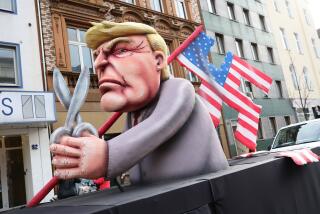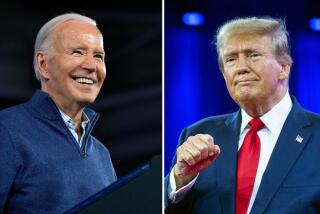Trump campaigned on ‘America First.’ Now he’s getting ready for his first trip overseas

President Trump leaves Friday for his first trip abroad. (May 15, 2017) (Sign up for our free video newsletter here http://bit.ly/2n6VKPR)
At his inauguration in January, President Trump looked down the National Mall and described a nation beset by “carnage,” its jobs going overseas and its military overextended to the advantage of other countries. He declared “America first,” a new inward-looking doctrine that invoked the phrase of the nationalists who opposed entering World War II.
Yet as Trump prepares to depart Friday for his first trip abroad, he no longer behaves like a president eager to disengage from the world, and from the postwar alliances of the last seven decades that he so denigrated as a candidate. Nor is the foreign stage looking as receptive to his anti-globalism as he had once expected, and hoped, when nationalists seemed ascendant only months ago.
The dual developments make Trump’s debut abroad a big test of just what he means by “America first.” While American allies look anxiously for clarification, Trump aides see no disconnect.
“President Trump understands that America first does not mean America alone,” said his national security advisor, H.R. McMaster. “To the contrary, prioritizing American interests means strengthening alliances and partnerships that help us extend our influence and improve the security of the American people.”
After Trump’s initial days in Saudi Arabia and Israel, he will arrive in Europe at a time when voters in several countries — Austria, the Netherlands and, most recently, France — have turned back a right-wing populist wave that seemed to be overtaking the globe’s liberal democracies last year, as suggested by Britain’s vote to leave the European Union and by Trump’s unexpected election. The backdrop for Trump’s trip would be altogether different had French voters not so overwhelmingly rejected the anti-immigrant, nationalist campaign of Marine Le Pen this month — a rebuke to a movement with which Trump was openly sympathetic.
Yet if the foreign scene has changed since his election, so, it seems, has Trump as he grasps the reality of governance.
The man who as a candidate called the North Atlantic Treaty Organization “obsolete,” as president has declared its European members America’s “best friends and the best allies in the world.” He will attend a celebration of NATO’s new headquarters in Belgium during his eight-day visit in the Middle East and Europe.
Trump declined to pull out of either the North American Free Trade Agreement that he’d called a job killer or the six-country Iran nuclear agreement he’d condemned as “the worst deal ever negotiated.” The 195-nation Paris climate accord has been given at least a temporary reprieve by a president who once said climate change is a hoax concocted by China.
Chief among the many foreign leaders Trump once derided, Chinese President Xi Jinping now counts as a friend in Trump’s telling. Meanwhile, the advisor most identified with Trump’s anti-globalist views, chief strategist Stephen K. Bannon, has lost his position on Trump’s National Security Council and now is seen infrequently during foreign policy conversations in the Oval Office.
Philip Gordon, a top foreign policy advisor in the Obama administration, said of Trump’s pattern so far that “whatever radical ideas are out there that he may have echoed in the campaign or that Bannon may have articulated, when it comes to making policy, it ends up in a much more traditional place.”
Trump’s shift has not fully calmed fears in the foreign policy establishments at home and among allies. He still has those tweets, phone calls and other provocations that make him unpredictable, inconsistent and, to some critics, incoherent. More than past presidents, he combines talk of economic and national security imperatives in dealing with other countries, suggesting trade-offs between the spheres that could risk a loss of American leverage. And he has genuflected to autocratic leaders and dismissed concerns with human rights to an extent that even his most pragmatic predecessors avoided.
But Trump’s nationalist, populist persona of the campaign trail, though it reappears from time to time at Trump rallies, has been largely replaced by a president whose foreign policy has failed, so far, to fundamentally alter the structure of U.S. foreign engagement built over the last 70 years.
“Certainly, if we discount the tweets, this seems to be a more establishment path. But I wouldn’t call it a policy,” said Alina Polyakova, director of research for Europe and Eurasia at the Atlantic Council and an expert on far-right nationalism. “We just have some inklings of what could be a policy.”
Many foreign policy analysts have viewed Trump’s shifts, along with the decisive electoral victory by centrist Emmanuel Macron over Le Pen in this month’s French election, as a sign that a recent wave of nationalism sweeping across Atlantic shores has receded, at least for a moment.
In Macron, “you had this young, dynamic candidate who campaigned on a distinctly pro-European integration message, pro-immigration, pro-economic reform and deregulation,” said Gordon, the former Obama advisor. “And he won big time.”
Yet Gordon and others have cautionary caveats. Right-wing populist and nationalist forces in Europe and the United States have been on the rise, even if they lately fell short. Le Pen’s vote tally — though only 33.9% — is double what her father, Jean-Marie Le Pen, attracted in 2002 running on a similar platform.
Polyakova said Trump’s election has had a pronounced effect in Europe, however, increasing the popularity of the European Union among the general population, which is fearful of Trump, and making the United States more popular among Europe’s far right, which is traditionally anti-American.
At the same time, she said she believes Trump may be seeing the value of long-standing alliances for America’s security and economy, and may also be responding positively to the expressions of loyalty shown by allies in Europe and the Middle East.
Trump’s allies say the president has been misconstrued all along.
“There is this kind of ‘showman Trump,’ where he uses this professional personality he’s had for his entire life” to poke foes and animate supporters, said James Carafano, an analyst at the conservative Heritage Foundation who advised Trump and his team during the postelection transition. “Then there’s the serious Trump.”
Carafano argued that Trump’s declarations in speeches and on Twitter were not intended to be a serious expression of his foreign policy. His real actions are being defined by the team of experienced, mostly conventional foreign policy leaders around him, a group that does not include Bannon.
”When it comes time to make a serious decision, even he’s not going to listen to what he said on the campaign trail,” Carafano said of Trump. “He’s going to sit down and say, ‘What is the serious thing to do?’”
That does not mean Trump will embrace NATO and other multilateral organizations with the same zeal that President Obama and other predecessors did. Carafano said Trump sees value in alliances to achieve American goals but is more eager to emphasize ties to the individual member countries than the organization tying them together.
Walter Russell Mead, a professor at Bard College and fellow at the Hudson Institute, a conservative think tank, likewise sees Trump’s trade policy to date as largely status quo. He argued that some of Trump’s post-campaign shifts are no more dramatic than those of his predecessors, like Bill Clinton’s reversal in supporting NAFTA after he campaigned against it, and George W. Bush’s flip from opposing nation-building as a candidate.
As for Trump’s nationalist rhetoric, Mead argued that elites in Europe and the United States overstate Trump’s meaning.
SIGN UP for the free Essential Politics newsletter »
“People who react negatively to the concept of nationalism, who see it as the same thing as chauvinism, would hear a call like ‘America first’ and immediately think ‘America first and everybody else never,’” he said. “But to a lot of average Americans, they would think, ‘Of course, America first. Like that’s your job. You’re president of the United States.’”
Still, Trump’s foreign policy remains an open question. At some point, Trump will have to deliver on some of his nationalist and populist promises in the foreign arena.
“It is part of Trump’s political brand,” said Charles Kupchan, a top Obama advisor and senior fellow at the Council on Foreign Relations. “And so I think right now what we’re seeing is a kind of tug of war: those who embrace a more conventional approach to these issues and those who are more mindful of the domestic political calculus that’s at play.”
Twitter: @noahbierman
ALSO
After a week of self-inflicted chaos, Trump could see long-term costs to his presidency
Trump defiantly mocks critics in speech at Liberty University
Don’t politicize FBI pick, lawmakers urge Trump (and hand over any tapes, they add)
Trump’s statements linking Russia investigation to Comey firing could lead to legal problems
More to Read
Get the L.A. Times Politics newsletter
Deeply reported insights into legislation, politics and policy from Sacramento, Washington and beyond. In your inbox three times per week.
You may occasionally receive promotional content from the Los Angeles Times.







